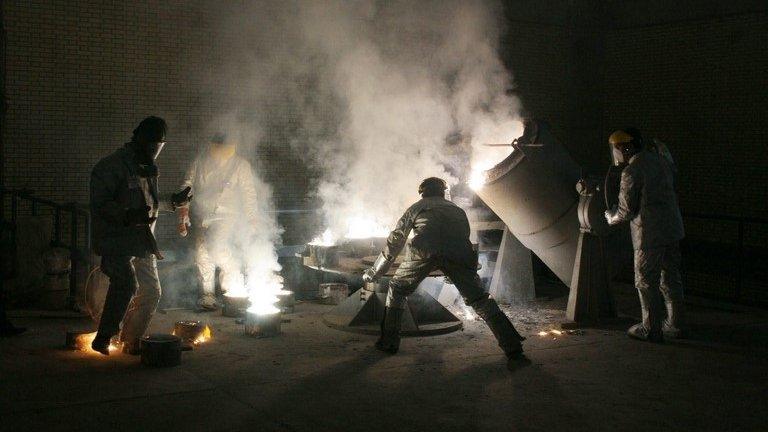Why are congressional Democrats considering new Iran sanctions?
- Published
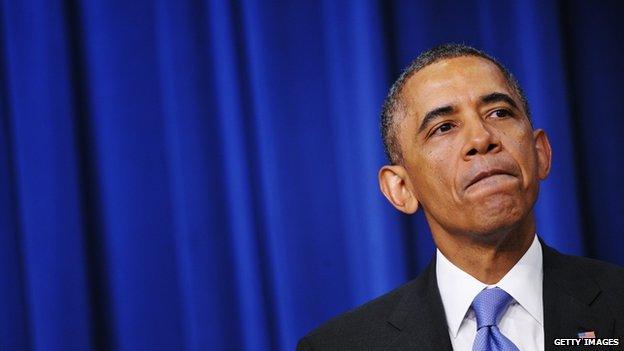
President Barack Obama met Democrats behind closed doors to make his case against sanctions
This week President Barack Obama met congressional Democrats, asking them to vote against sanctions on Iran and support continued negotiation.
But the administration's overtures may be too little, too late.
In a highly partisan atmosphere and with mid-term elections coming later this year, it would be very difficult for Democrats to go against a president of their own party, especially on foreign policy - an area where Congress mostly defers to the president.
That is particularly true when the president speaks repeatedly and publicly about the inappropriateness of the action Congress is considering.
But Mr Obama's team is doing an impressive job of encouraging congressional Democrats to hand the president a stinging defeat: namely, to pass legislation about the Iran nuclear negotiations which Mr Obama has described as sure to torpedo those talks.
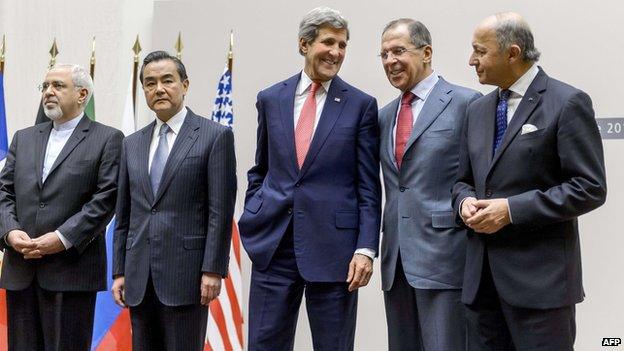
The deal reached by foreign ministers in Geneva last November has not satisfied many in Congress
'War'
The Obama team accuses those with whom they disagree of wanting war, posing the issue as: negotiate, or pass the legislation and leave war as the only option.
That enrages many in Congress who point out that the administration repeatedly opposed past congressional sanction initiatives and then, after those sanctions were enacted, went on to describe those sanctions as key elements in persuading Iran to come to the negotiating table.
Some in Congress suspect that the same dynamic seen over the last several years would apply to this new bill: the administration would strongly oppose it while it was under debate, and then once it was passed, would shift position 180 degrees to describe the new congressionally mandated pressure on Iran as central to persuading Iran to become more accommodating.
Bad cop?
In other words, most if not all of the congressional supporters of the proposed legislation see what they are doing as adding to US leverage in the negotiations.
Many of them think that they are playing the bad cop to the Obama administration's good cop in a way very similar to how Iranian Foreign Minister Javad Zarif and Iranian President Hassan Rouhani play the good cop to Supreme Leader Ayatollah Ali Khamenei's bad cop.
Each side can say to the other: "You have to help me do a deal I can sell to the hardliners who have much power in my country."
Perhaps this time, unlike the previous several times when Congress adopted sanctions legislation over the objections of the White House, the new measures would actually hurt the negotiations.
But Congress is not well-disposed to believe the administration's protestations that this is the case.
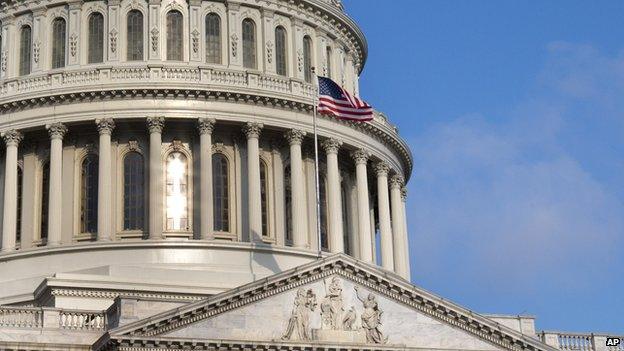
President Obama does not have particularly strong networks within Congress
Personal relations
It does not help that this comes against a background of congressional Democrats often being unhappy about a perceived lack of co-ordination and co-operation with the White House on a wide range of issues, such as how to respond when the healthcare rollout had so many problems.
Mr Obama does not have the strong personal relations with Congress members that some past presidents had, nor has he established consistently effective means for working out deals with Congress.
Further infuriating some of the congressional sponsors has been the Obama team's strong public stance about how Iran is sure to react to the bill if passed. This seems like a self-fulfilling prophecy.
After all, if President Obama predicts Iran will strenuously object if the bill becomes law, that puts Zarif and Rouhani in a position where they must react strongly or else they will attract domestic criticism.
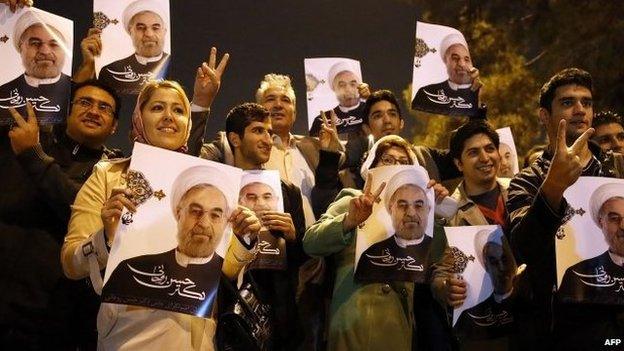
Supporters welcomed the Iranian delegation back home after the Geneva negotiations in November
In fact, they must show that they are taking an even tougher stance than Mr Obama predicts they will.
This dynamic has been seen before in Obama Middle East policy.
Criticism
When President Obama said that Palestinian-Israeli peace talks could continue only if Israel froze settlement activities, that put Palestinian Authority Chairman Mahmoud Abbas into a position where he had to be firmer than Obama on the issue of settlements, even though many analysts have suggested that prior to Obama's statement he was willing to proceed even if settlement activity continued.
He had seemed to care at least as much or more about Israeli release of Palestinian prisoners.
Many in Congress have been highly critical in private of President Obama's stance on the settlement issue - which did not in fact bring an end to settlements and which long impeded the resumption of Palestinian-Israeli talks - and they see the president's stance on the Iran sanctions legislation as repeating the same mistake.
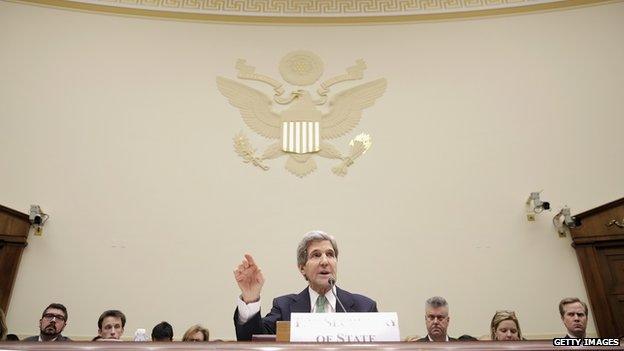
Secretary of State John Kerry has also asked Congress to give diplomacy a chance to work its course
Tough sell
Compounding the problem, the Obama team has not engaged with Congress about how to craft a more acceptable bill, instead gambling on killing the bill.
Having put so much energy into the issue, congressional supporters of the legislation want to be able to show they accomplished something: they need to be able to vote in favour of a bill that they can claim preserves their core objectives.
If the Obama team insists that instead these members of Congress fall on their sword for the president, that is a tough sell.
It is possible that more sensible heads will prevail: Mr Obama will engage with Congress to develop a vague but tough sounding bill which each side can claim gives them victory; the Iranians will huff and puff - presumably with the Majlis passing an even tougher sounding but equally empty bill; the Iranians will "walk out" (at the end of a session) and refuse to meet again (until the next regularly scheduled negotiation date); and the negotiations will continue.
But that is by no means guaranteed.
- Published10 December 2013
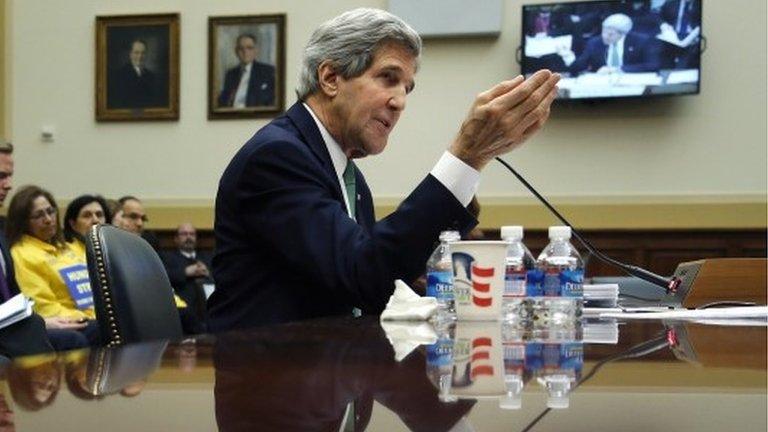
- Published25 November 2013
- Published24 November 2013
- Published14 November 2013
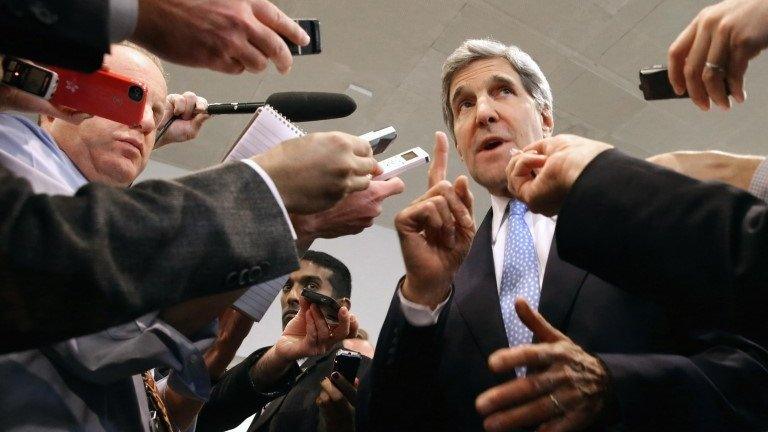
- Published20 January 2014
- Published25 November 2014
